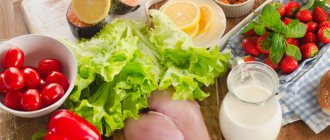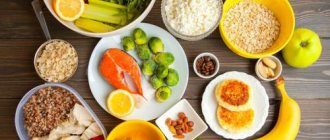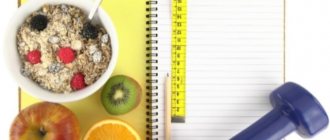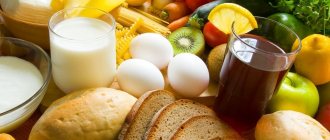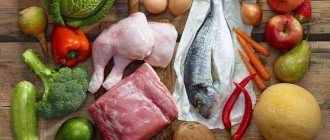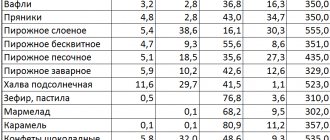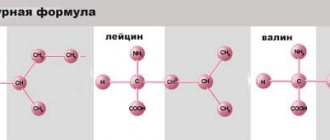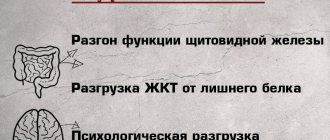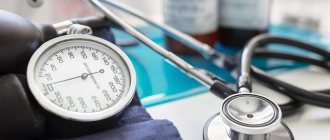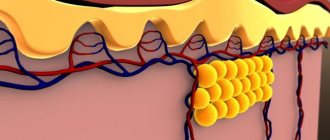Article provided by t-day.com.ua 2014-05-11 Views: 45,816 Rating: 5.0
| Medals articles >> |
Articles are loading...
In order to achieve excellent results and get the most out of your workouts, you need to pay attention to such a factor as the protein-carbohydrate window that occurs after the end of strength work.
The protein-carbohydrate window is a term that refers to the period that occurs within half an hour after a high-intensity strength training session.
The thing is that the body at this time needs to replenish muscle glycogen reserves, as well as to reduce the level of cortisol and adrenaline, which have a detrimental effect on muscle tissue. Raising the level of insulin, which inhibits catabolic processes, will help reduce the destructive effect of these hormones. Thus preventing the muscles from being destroyed. To maximize insulin levels, you need to eat carbohydrates with a high glycemic index (mainly sweet and starchy foods).
Carbohydrate window - myth or reality?
The concept of a carbohydrate window after a workout has become firmly established in the vocabulary of athletes. This is the name given to the time after exercise when the body lacks energy and nutrition to restore muscles.
But experts say: the term “carbohydrate window” is not correct. The body requires carbohydrates and proteins to recover, which is why the window is called “protein-carbohydrate.”
There are no scientific findings proving the need for protein-carbohydrate foods after training. Studies were conducted in which one group of people took protein in the morning and evening, and another group took it before and after strength training. The results are the same. In this regard, many nutritionists believe that the carbohydrate window is a myth that justifies eating sweets after workouts while losing weight.
Although there is no consensus on the theory, you can test it for yourself. After playing sports, regularly drink a glass of kefir or yogurt with the addition of cottage cheese and 3 tsp. honey After 1-2 months the result will become noticeable. If the protein-carbohydrate window works, you will lose weight and gain muscle.
There is an assumption that in the evening at 11-12 at night another window opens - the protein window. Scientists consider it a myth, but athletes confirm that eating protein foods at this time accelerates muscle gain.
Carbohydrate window after exercise
Often referred to in bodybuilding is the idea of a narrow or short CARBOHYDRATE WINDOW, which "opens" immediately after training, during which time the body is able to absorb a particularly large amount of nutrients. Carbohydrates and proteins, especially.
The idea seems reasonable, especially considering the huge number of articles on this subject in various fitness publications. Everyone recommends drinking protein or gainer (“liquid carbohydrates” in strong concentration with a small amount of protein).
But for a very long time this idea seemed a little far-fetched to me.
In 2012-2013, I served in the army, and there I did not have the opportunity to consume carbohydrates according to the “carbohydrate window” theory, although before this period of my life I always adhered to it regularly.
Guess what happened?
I haven't lost ANYTHING AT ALL!!! The opposite happened. I was able to gain even more muscle mass than before. Strange, isn't it?
Although, at that moment I was very worried that I would be completely blown away during the army.
But no, I scored even in those conditions.
Now I always smile at statements that a person does not have the opportunity/place/time to shape his body, remembering how I pumped up my abs under a blanket in the army so that old-timers wouldn’t see)
By the way, so as not to be unfounded, here are my photos before the army (a year before) and after, for clarity:
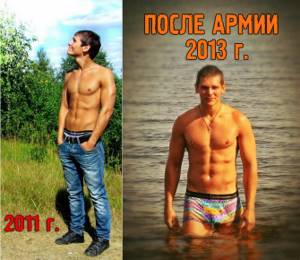
When I returned from the army, I no longer loaded up on “fast carbs” immediately after a workout.
Now I always just drink water after training, calmly drive home, and after 1-2 hours I calmly eat regular food. Usually these are eggs or meat with vegetables.
I don't notice any negative changes. And now I even feel better, because, in my opinion, digestion is even better than before.
Restoring muscle glycogen stores
Another reason why it is recommended to use large doses of carbohydrates immediately after training is the need to restore glycogen spent during training.
Glycogen is a carbohydrate that is stored directly in the muscles (it is spent during training as energy).
I have read many experiences on this subject, many of which were very contradictory.
Most of these experiments have shown that glycogen levels actually recover faster if you drink carbohydrates after a workout.
But all of these studies had similar imprecisions.
All the training that was mentioned in the studies was aimed at endurance or, at best, strength endurance.
The fact is that during endurance training, an oxidative method of energy supply is used, and during strength loads in the gym, ANAEROBIC GLYCOLYSIS (the main source is muscle glycogen).
Those. in the gym we actively spend carbohydrates (muscle glycogen), so it would not be surprising that he should recover faster after such a workout.
In one experiment, there was evidence that CARBOHYDRATES IMMEDIATELY AFTER STRENGTH TRAINING INCREASED MUSCLE GLYCOGEN LEVELS 16% MORE EFFECTIVELY THAN ORDINARY WATER AFTER TRAINING.
Some might say that 16% is a lot! But think carefully about what is better? Regarding ORDINARY WATER, which is generally zero in terms of nutrients.
Let me make a small correction. If you haven't eaten anything at all within 1-2 hours after training, YOUR GLYCOGEN IS STILL RESTORED. And very active.
Conclusion: Glycogen accumulates cumulatively, i.e. gradually, over the course of a day or even two.
Maximum accumulation of glycogen in muscles requires not a quick, one-time intake of carbohydrates after training, but regular and fractional intake of carbohydrates throughout the day.
That is, as we understand, after training it is not the carbohydrate window that is open, but the real CARBOHYDRATE GATE, which actively continues to accumulate carbohydrates after training for 24-48 hours.
Insulin sensitivity
Experiments were conducted to measure insulin sensitivity after training. I would like to remind you that strength training increases insulin sensitivity, i.e. carbohydrates are used as energy more efficiently.
This thing has been known for a long time, so diabetics and obese people are advised to reduce insulin resistance through strength training.
How long do you think insulin sensitivity increases after exercise?
Experiments (Bilen M., Vandereit H. et al. 2008) have shown that increased insulin sensitivity persists for more than 24 hours after training!
Conclusion: There is no need to stuff yourself with carbohydrates immediately after training (especially hard ones). You can safely return home and eat natural food (not a gainer, but a portion of buckwheat or potatoes).
It won’t make you any worse, because TOTAL DAILY INTAKE OF CARBOHYDRATES IS IMPORTANT, AND NOT HOW MUCH YOU EAT THEM IMMEDIATELY AFTER THE TRAINING.
Does it make sense to take protein + carbohydrates immediately after training?
If you ask the vast majority of athletes whether they need to eat protein-carbohydrate foods immediately after training, then the vast majority will say that: “YES, definitely”!
If you look at it, this makes sense, because... carbohydrates contribute to a large release of the transport hormone insulin, which successfully transports both carbohydrates and proteins to the places of their use.
But recently I had the opportunity to study interesting experiments (Tipton K.D., Miller S.L., Rasmussen B.B. et al., 2009) regarding the absorption of various gainers (lots of carbohydrates + moderate protein). And the experiments yielded unexpected results: PROTEIN SYNTHESIS IS DECREASED BY 30% IF YOU TAKE FOOD IMMEDIATELY AFTER YOUR TRAINING.
By the way, link to the study: https://pubmed.ncbi.nlm.nih.gov/11440894-timing-of-amino-acid-carbohydrate-ingestion-alters-anabolic-response-of-muscle-to-resistance-exercise/
Therefore, do not rush to eat immediately after training. It is better to eat after 30-90 minutes.
How long does the carbohydrate window last?

It has not yet been possible to find out what the carbohydrate window is - myth or reality. But the practice of consuming proteins and carbohydrates after workouts is very popular. Many people who are losing weight have achieved good results and lost 5-6 kg in a month thanks to this technique.
Observations of control groups of volunteers showed that the rate of anabolism within 2 days after strength training is different. How long the carbohydrate window lasts depends on the intensity of your exercise. In the first 3 hours there is an increase of 110%, after a day - by 60%, after 2 days - by 30%.
Based on our observations, we conclude that consuming protein and carbohydrates is beneficial in the first hours after exercise. This is the carbohydrate window. But the term does not imply eating heavy food immediately after physical activity. A protein shake and a little sweet are enough: light food is digested faster.
In the evening, you can indulge in a hearty dinner with proteins. At night, the muscle recovery process accelerates, and the body will need protein and additional energy.
Is there a carbohydrate window after a workout?
To answer this question, I highly recommend that you read a large-scale study conducted in 2013 by Alan Aragon, a well-known healthy lifestyle myth buster in fitness circles: https://pubmed.ncbi.nlm.nih.gov/23360586-nutrient-timing-revisited -is-there-a-post-exercise-anabolic-window/
The conclusions from this study are quite convincing, namely: “With a balanced diet with sufficient protein, consuming carbohydrates or carbohydrates in combination with protein during the so-called “carbohydrate window” does not provide any significant benefits either for muscle growth or for preventing catabolism."
I can also say that even if the glycogen in your muscles is completely depleted, its replenishment occurs within 24 hours, regardless of whether carbohydrates were consumed during the carbohydrate window or not.
The role of carbohydrates after exercise
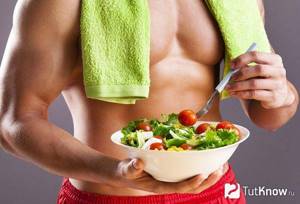
The goal of sports training is to lose weight and build muscle mass. During speed and strength exercises, microcracks form in the muscles. To “repair” them, the body requires protein.
In the first 30-40 minutes after exercise, the body actively synthesizes proteins from amino acids. The process is called anabolism. At the same time, proteins break down and catabolism occurs. For an athlete, it is important that synthesis occurs faster than decay.
Due to the body's need for protein compounds, it is recommended to drink a protein shake after training. But protein synthesis also requires fast carbohydrates.
Penetrating into the body, these substances are synthesized into glucose and used to produce energy. Excess carbohydrates are stored as subcutaneous fat and glycogen in muscles. The latter is consumed quickly. If you do not replenish the lack of glucogen after exercise with food, the body begins to synthesize it from amino acids contained in the muscles. The process is influenced by the hormone cortisol, produced after stress. Protein breakdown accelerates and synthesis slows down.
Carbohydrates entering the body immediately after training stimulate anabolism and slow down catabolism, regulating hormonal levels:
- They activate insulin production, helping amino acids to “repair” existing cracks in muscle tissue. Insulin is produced in response to the intake of carbohydrate and protein foods.
- The combination of proteins and carbohydrates increases the level of growth hormone. It accelerates anabolism and slows down catabolism, helping to build muscle mass.
- The volume of the hormone cortisol, which destroys muscles, decreases. It stimulates the release of amino acids from muscle tissue, which causes protein compounds to break down. The less cortisol, the better for muscle growth.
Important! Carbohydrates are only beneficial post-workout if consumed in combination with protein.
- See also what carbohydrate and fat blockers are
What to eat before training?
There is a lot of controversy about this. Some people say that you can’t eat 2 hours before a workout, someone that you can’t eat meat, someone insists that you must eat before the workout, etc. Let's look at all this in more detail.
Let's start in the morning.
BREAKFAST is a much more important meal than the one before your workout. Because before breakfast you didn’t eat for about 8 hours, and before eating before training for about 2-4 hours.
In the case of breakfast, your body experiences a much more serious energy deficit than in the second.
You can often hear advice that you should never eat before training, because this leads to the outflow of blood from the muscles to the stomach during exercise. This seems somewhat true.
Indeed, if you eat solid food (meat, fish, etc.) 30-60 minutes before training, this will complicate the training process, because... your belly will be full of solid food, which will take several hours to digest.
If you look from the other side, eating (any) leads to the PRODUCTION of INSULIN by our pancreas (in the beta cells of the islets of Langerhans, to be precise).
And insulin, as we know, is a TRANSPORT HORMONE, which doesn’t care what it transports.
But insulin has another very interesting property.
INSULIN INCREASES BLOOD FLOW INTO MUSCLES, and accordingly increases the flow of oxygen, amino acids (constituents of protein molecules) and other nutrients (study by Coggins et al. 2001).
Here is a link to the study, by the way: https://pubmed.ncbi.nlm.nih.gov/11723050-physiologic-hyperinsulinemia-enhances-human-skeletal-muscle-perfusion-by-capillary-recruitment/
In simple terms, EATING BEFORE TRAINING STRENGTHENS PROTEIN SYNTHESIS IN MUSCLES.
Interesting studies have been conducted on this subject, which looked at protein synthesis DURING TRAINING, after a person takes liquid food (gainer).
It was found that AFTER TAKING LIQUID CARBOHYDRATE-PROTEIN FOOD BEFORE TRAINING, PROTEIN SYNTHESIS INCREASES AT LEAST DOUBLE!!!
The same study was conducted with liquid food intake after training. This study found that protein synthesis was stimulated less by a liquid meal after exercise than by a meal before.
I’ll make a disclaimer about the gainer. I am VERY SKEPTICAL about this supplement for the reason that:
GAINER = MALTODEXTRIN (corn sugar) + PROTEIN (protein).
Maltodextrin is a by-product of the production of sugar and starch.
Honestly, I don’t understand why people overpay for regular sugar (a quickly digestible carbohydrate with a high glycemic index), if you can just as easily grind corn flakes into a protein shake (for example, Lyubyatovo, which are very cheap) or simply eat it for 30 minutes before training, 2-5 bananas and wash it down with protein.
Conclusion: It is much more effective if you take a liquid meal BEFORE TRAINING than after, due to insulin secretion. Preference should be given to liquid rather than solid food. A gainer for gaining muscle mass is not at all necessary, because... it's just PROTEIN + CARBOHYDRATE (fast-digesting).
How to close the carbohydrate window?
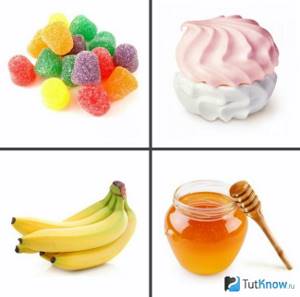
People trying to lose weight perceive the concept of a “carbohydrate window” as an excuse to eat something sweet after a workout. Such food is good for the body. But fast food, pastries and cakes will not help you lose weight and strengthen muscles. To close the carbohydrate window, certain foods are required that will restore the lack of protein compounds and give the body energy.
How to close the carbohydrate window depends on your goals. To lose weight, it is not necessary to consume carbohydrate foods immediately after training. A calorie deficit is necessary, but how it is achieved does not matter.
Close the carbohydrate window for gaining muscle mass by consuming 0.8 g of carbohydrates per 1 kg of body weight and 20 g of protein. With a body weight of 70 kg, 55-80 g of carbohydrates (250-300 kcal) and 20 g of protein (80 kcal) are required immediately or within an hour after training.
To effectively build muscle mass and lose excess fat, any product will not work. You need to know how to close the carbohydrate window after a workout so as not to harm the body. During this period, active recovery occurs. Poor quality food will lead to the development of diseases.
The carbohydrate window after a workout for weight loss should not be closed with fast food, cakes, chocolate and other sweets containing fat. Such food is not considered healthy at all: it should not be consumed after physical activity.
Closing the carbohydrate window when losing weight with fruits, vegetables or cereals will also not work. These foods contain slow carbohydrates, which slow down insulin production.
When losing weight and gaining muscle mass, the carbohydrate window is closed with light carbohydrate foods without fat.
These include:
- natural marshmallows;
- marmalade;
- honey;
- bananas, strawberries;
- sweet compote
They have a high glycemic index and quickly increase blood sugar levels.
For a post-workout snack, it is convenient to take a protein shake with honey with you. You can prepare it yourself from milk, yogurt, kefir, egg white and cottage cheese.
Instead of making a homemade protein shake, you can make a drink from a dietary supplement sold in powder form. For the “lazy” ones, gainers are sold - ready-made cocktails. 100 g of the finished product contains 75 g of carbohydrates and 15 g of protein compounds.
In the evening after training, prepare yourself a hearty dinner including slow carbohydrates and protein.
Suitable carbohydrate products:
- natural sweets (fruit marmalade, marshmallows, honey, dried fruits);
- jam;
- brown rice or buckwheat;
- jacket potatoes.
You can replenish the lack of proteins with low-fat dairy products, fish, cottage cheese or chicken. Don't try to eat a lot: you shouldn't overeat at night. You should feel full, but not overeat.
Why do you need to close the white-carbohydrate window?
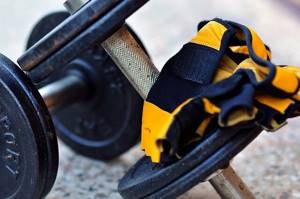
Is it necessary to close the carbohydrate window after training, since doctors do not recommend starting to eat right away? If you rationally approach the choice of diet and do not exceed the permissible portion (in kilocalories), then, of course, it is necessary! This will not only accelerate muscle growth , but will also prevent loss of strength.
A “shock” portion of glucose after physical activity promotes the production of growth hormone and also increases the concentration of insulin in the blood. All this together contributes to faster protein absorption.
If you constantly use the glucose-carbohydrate window in training, then muscle mass will be gained as quickly as possible. With this diet, the body absorbs 30-40 grams of protein , which goes specifically to building muscle mass . Therefore, if you are pursuing the goal of building muscle, do not neglect the carbohydrate window and replenish your energy reserves on time.
What happens if you don't close the carbohydrate window?
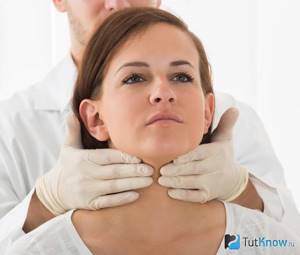
During physical activity, the body loses a large amount of energy. If you do not replenish it, your general condition will deteriorate sharply.
Lack of protein and carbohydrates negatively affects the condition of internal organs:
- the chemical composition of bone and cartilage tissue changes (minerals are washed out to compensate for the general deficiency of these compounds);
- metabolic processes slow down due to lack of calories;
- muscles are destroyed;
- hormonal balance is disrupted;
- liver cells enlarge to deliver sugar to the muscles faster;
- protein synthesis and muscle mass recovery slow down;
- the load on the digestive tract increases.
Regular carbohydrate deficiency leads to the development of thyroid diseases, exhaustion, and hormonal disorders.
Sports supplements for training
In order to quickly close the protein-carbohydrate window, gainer and protein are great; this is an excellent way to quickly absorb protein and carbohydrates. The big plus is ease of use and improved digestion, because liquid food is much better tolerated by the gastrointestinal tract, but the minus is the high cost.
Sports nutrition greatly helps both in gaining weight and losing weight; to gain weight, focus on 60% gainer and 30% protein; for weight loss, on the contrary, 60% protein and 30% gainer.
It is also simply necessary to take BCAA, in the morning, before and after training, in an amount of 5-8 g. These amino acids quickly enter muscle tissue, enhancing protein synthesis and inhibiting catabolic processes that destroy muscles.
Therefore, if possible, be sure to take sports nutrition during the protein-carbohydrate window, just remember that this is just a sports supplement and is used as an aid to the main diet, first of all, take products for weight gain or weight loss, it all depends on what you are doing. what is your ultimate goal
Carbohydrate window when losing weight - how to close it?
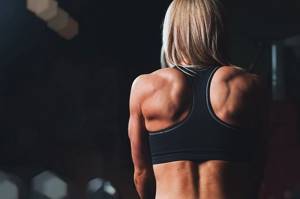
What is the carbohydrate window after a weight loss workout? It is recommended to slightly increase the portion of proteins, but decrease carbohydrates . So-called “fitness bars” based on simple cereals are ideal for this purpose.
Is it possible to prepare a cocktail to close the carbohydrate window from natural ingredients? The simplest recipe:
- skimmed milk;
- 20-30 grams of whey protein;
- 1 tablespoon of condensed milk, honey or cane sugar (fructose is also great, but it takes much longer to break down);
- 1 medium pear.
It should be taken into account that the proposed options are suitable exclusively for building muscle mass and specifically for men . The option for losing weight is also suitable for women, you just need to remember about the permissible daily dose of protein . For men it is 2.5 grams per kilogram of live weight, for women it is 1.55-1.65 grams . The protein-carbohydrate window makes up approximately 15-20% of the total daily diet. This “dosage” should not be exceeded.
